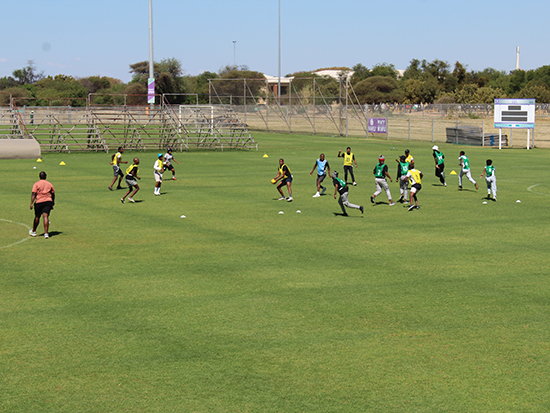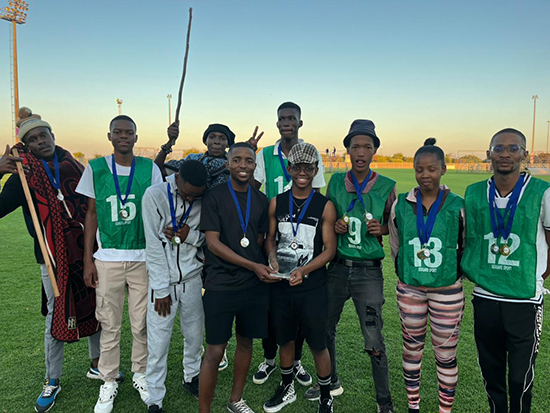By Gofaone Motsamai and Mzwandile Ndlovu
Once played in dusty village yards and open fields where laughter echoed and children learned teamwork through play, indigenous games used to be at the heart of African childhood. Today, many of those games - from morabaraba and diketo to mmela and ntimo - are fading from memory, overshadowed by modern sports. But at the North-West University’s (NWU’s) Mahikeng Campus, those forgotten rhythms came alive again as the institution hosted its first-ever Indigenous Games Varsity Tournament.
The tournament, which took place from 30 September to 2 October 2025, was inspired by PhD research conducted by Khumo Feni, an indigenous knowledge systems (IKS) PhD candidate and IKS coordinator at the NWU. It aimed to show the value of African games in an academic environment.
“I hope it demonstrates the potential of Indigenous games to address the needs of society,” says Khumo. “This initiative responds to the National Sports and Recreation Act of 1998, amended in 2007, whose core objective is to address historical imbalances and promote fairness, democracy and inclusion within sport and recreation activities.”
Khumo explains that the project also aligns with the Protection, Promotion, Development and Management of Indigenous Knowledge Act 6 of 2019 “The Indigenous sports of South Africa should be reignited.”
Cultural diversity in motion
Basotho, Batswana, Zulu and Bapedi cultural societies were represented, and students wore traditional attire while taking part in games that crossed linguistic and cultural lines.
“People from cultures across Southern Africa are known to play diketo, morabaraba, mmela and ntimo,” says Khumo. “The same games are played; the main differences are in the names and rules.”
Some teams were made up of students from different backgrounds, showing the spirit of inclusion. Team Sunshine, for example, brought together players from various groups and went on to win the khokho game.
Khumo notes the international links reflected in the games: “Khokho is Indigenous to India, and morabaraba is also played in Nigeria. This shows how connected we are in our intercultural approach.”
Community participation added more interest to the event, with provincial champions in diketo and khokho joining. “We’ve received requests to invite more community organisations and universities for our 2026 games,” Khumo says.
From a campus initiative to a national cup
Looking ahead, Khumo’s vision for the Indigenous Games Varsity Tournament is clear.
“As the NWU, the first university to produce BIKS graduates in South Africa and a leader in Indigenous games research, we plan to include other universities in our Indigenous Sports Varsity Cup starting in 2026,” she says.
The 2025 tournament was a pilot project to gauge interest and demand for Indigenous games within university culture. “It will be an annual event,” Khumo confirms.
Over the three days, participants played five games that tested teamwork and focus:
· Dibeke/gash/lebuse – Won by the Setswana Students Society
Dibeke is a fast-paced team sport involving 8–10 players per side, where teams alternate between fielding and running to score points through strategic play, speed, and coordination.
· Khokho/peba pera tswa moo! – Won by Team Sunshine
Khokho is a tag-based game between two teams, where the fielding team (“cats”) uses teamwork to tag out the opposing team (“mice”) within a set time, following strict scoring and foul rules.
· Mmela – Won by the Basotho Society
Mmela is a strategic board game where each player uses 12 tokens (“cows”) to form rows of three, earning points through careful placement and movement.
· Morabaraba/incuva – Won by the Bapedi Society (Tshepiso)
Morabaraba is a traditional board game with 24 holes and six players per side, where players aim to capture opponents’ pieces and reach the “kraal,” a safe zone that protects their tokens.
The player of the match title went to Tshidiso Mofokeng from the Basotho Society, who impressed audiences with his skill and effort.

Players display speed and coordination during indigenous games at the North-West University’s inaugural Indigenous Games Varsity Tournament.

Winners celebrate their achievement, embodying the unity and pride that defined the tournament.
